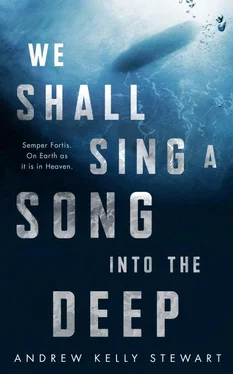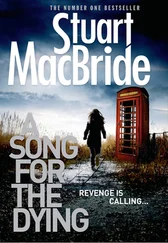“The Last Judgment…” I say, and the words sound odd on my lips.
“It doesn’t work, though… the missile,” this woman named Adolphine says. “Calvert. He was the electrician for the ship, yes? He told us… the missile wouldn’t fire. Some part of its targeting system has been faulty since the first days of the war. Told us that your Captain… this Amita… he knew it wouldn’t fire. That’s why we decided to try and reach out to him. We were trying to reason with him… trying to get him to come in. To bring all of you in, to safety.”
I could not speak if I wanted to. This river of information, inundating. Spilling over me.
“That’s why I’ve been taken,” Adolphine says. “Your brothers… they lined us up on the deck of our ship and took turns executing us. They were asking who knew electronics. I… I kept myself from being killed. I volunteered. In order to stay alive.” Her voice, so soft, cracks, pained with guilt. “But I won’t fix it. I will die first.”
She pauses.
Footsteps sound on the deck above. Brother O’Shea, patrolling the central corridor of the chapel. I can tell by the weight, the particular gait in every footfall. He pauses a moment, right outside the cell above, by the sound of it, and then continues on.
“You were probably taken from a Guam boat when you were young,” Adolphine continues, quieter than before. “That’s where you must have seen the symbol.”
“I… I was saved. We were all rescued from the Topsiders. The wicked.”
A dark sort of laugh. “This boat has been kidnapping boys for almost twenty years. Malaysia, Indonesia, Oceania. Australian ships. I grew up on Guam, hearing about the raids.”
No. No more!
I replace the plate, begin screwing it back into place.
“ Wait! ” she hisses.
But I do not.
“ The world didn’t end, ” she continues, her voice only slightly raised, muffled. Only just quiet enough to be quiet. But the words still audible. “People survived. More than half the world is still alive. Some lands are poisoned, but many are not. Much of the radioactive fallout has settled out of the atmosphere. There’s been war, but now we’re on the brink of peace. We have survived . You have to tell people this… we are not your enemy! ”
I can listen to no more.
But that word haunts.
We .
* * *
“What?” I ask Ephraim, who has been giving me furtive glances all morning.
“You got up last night, before Vespers,” he says, softly, even though we are alone for the moment in the balneary. The one among us who observes silence most ardently. He’s helping me to dump the steamed bits of fish—guts and gills and eyes—into the wide tub we use for oil pressing.
“Ex-Oh Goines asked me to check on one of the bilge pumps, below the chapel,” I say, not looking at him, hoping he will not see the lie in my eyes.
He accepts this excuse without question, but I’m not convinced he believes it.
“You must be tired,” he says as we hoist the hundred-pound weight by pulleys and lower it over the tub.
“Very,” I say.
I did not sleep at all upon slipping back into my bunk. Could not.
Not after everything the interloper said to me.
Out of everything she told me, it was a question that burned in my mind, kept my eyes open to the dimness.
The missile. The Last Judgment.
Why would Caplain give me a key to a missile he knew would not work? Perhaps he intended for us to finish our mission.
The reverie is broken by the appearance of Brothers Jessup and Ignacio, each carrying an end of a long, canvas-bound package.
A body. That it is sewn up in a canvas hammock means it has come from aft. The form inside is small, light in their arms.
They deposit their delivery upon the table and exit without a word.
I feel, inside the frayed, brown and yellow and green stained sack, the body, the hard, thin limbs. The shape and size, familiar.
I freeze.
Ephraim and I share a look. He doesn’t stop me as, heart pounding, cold building in my belly, I tear open a bit of the seam at the corner of the head of the pouch. Just enough to peer inside. I brace my heart for the reality that it will be Lazlo’s lean, pale bronze face staring up at me—but… it is not.
This is Bartholomew.
A Demi who was cast back into engineering months ago. Bartholomew, who had survived his cutting, and had a lovely, deep and smooth voice until he did not. Until the voice cracked, soured. He is barely recognizable. Face gaunt, skin stretched across the skull. Eyes hollow and sunken. Cheeks and chin speckled with sores. Red lips. No hair except for in scrawny tufts.
The smell of death chokes me. I gag, must turn away. Ephraim as well. Only after we’ve regained our breath, taking a step away from the fetid stink, do we finish the job, covering him once more. We hoist his body carefully into the torpedo tube. It fits easily, he is so slight. Then we seal and pressurize, and, upon reciting our prayers respectively, I open the torpedo tube doors, and Ephraim hits the firing trigger.
Hiss.
Fizzle.
Another soul relinquished to the sea.
Ephraim places his hand squarely upon my shoulder. His commitment to silence is, in this instance, a comfort.
The moment is broken by the harsh ringing of the hull.
Sext.
The midday hour. The part of the day where the light should be shining on us fully, were we standing out in the open air.
God’s light, bathing us.
We sing Kyrie eleison.
Lord, have mercy.
Caplain Marston speaks—our lesson for the day, one that is different than Caplain Amita’s message that we were to pray for the Topsiders. For those who are suffering during these long years of tribulation.
No, Marston’s message is harsh, even in the hour of the Kyrie. Mercy has already been delivered to those who have deserved it. So, in this time, we instead praise the penitent. Those who have done God’s work. To acknowledge the mercy God has shown us, particularly we Choristers, who were saved. Who were purified.
Lord, have mercy.
But there is no mercy here on this ship.
Lazlo was penitent.
He was kind and good.
And he is being punished. For what?
All because he discovered the truth. That, maybe, not all the Topsiders are evil. That, perhaps, they were even trying to help us. That there is still a world up there, even after we unleashed God’s fury.
And, if this prisoner Adolphine is telling the truth— if . She might not be. She might only be feeding me lies in order to try and save her own skin. Caplain Amita knew the missile wouldn’t fire, and he never tried to find a way to fix it. He never planned on delivering the Last Judgment.
Does this mean that he lost faith in the end?
It’s a question that makes my stomach turn.
Was I stolen? Taken away from parents who might have loved me? Were my parents killed, like so many others, at the hands of my fellow brothers? All by order of Caplain Amita himself. A man who I have revered above all.
I know only one thing for certain. He entrusted the key with me, not Marston. He entrusted me with it because he did not trust Marston. Caplain Amita told me as much. That Marston would not hear the call from God when the time eventually came.
The caplain didn’t destroy the key, though. He could have done that. Could have thrown it into the sea, to ensure the missile would never be fired.
No, he truly meant, if the time came for the missile to be fired, it should be my choice. But why mine?
* * *
“Where are you from?” I ask, looking up once more through the grate, into the darkened cell above.
Читать дальше











